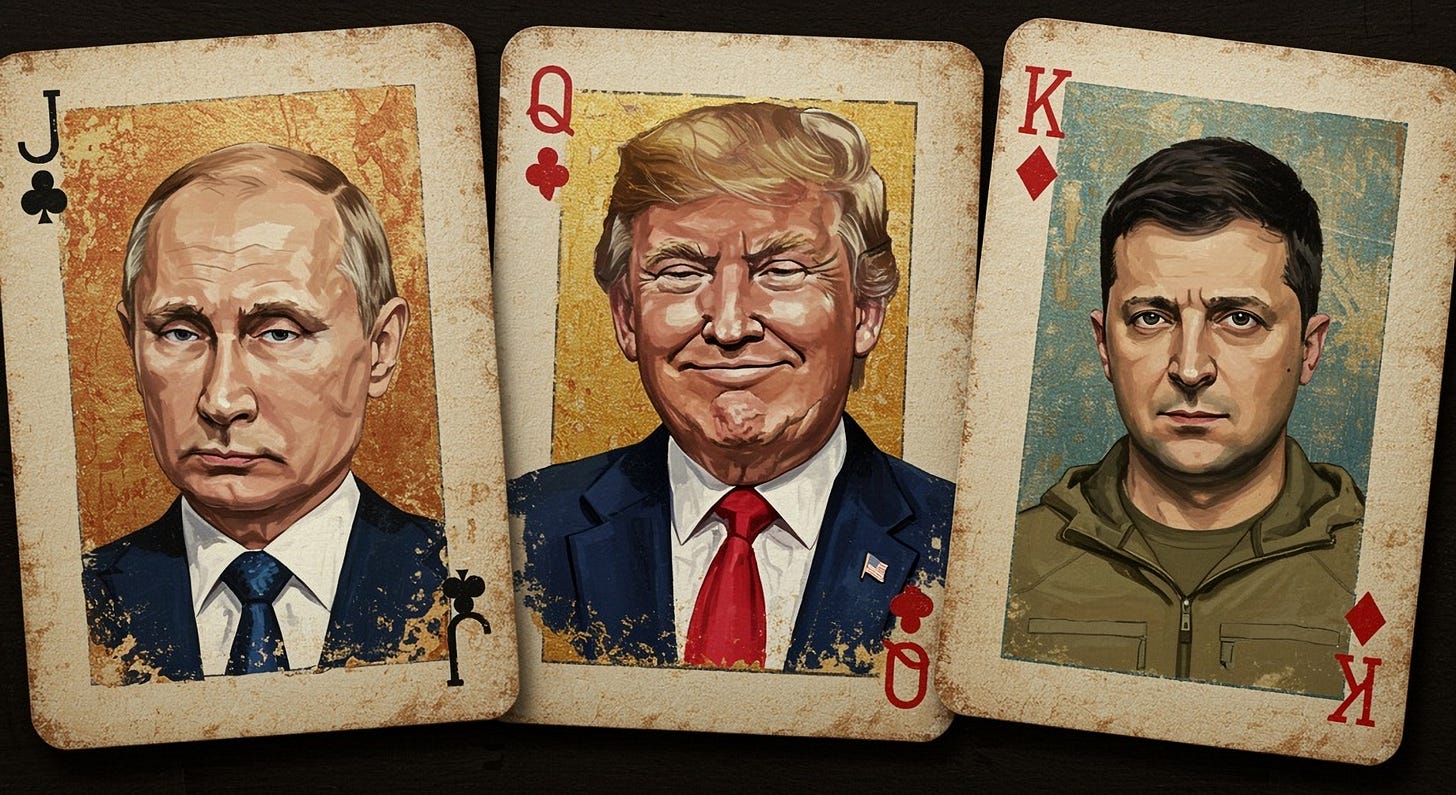War games are like card games for Donald Trump. Once, to belittle President Volodymyr Zelensky, he snarled, “You don’t have the cards,” as if the Ukrainian leader was playing a losing hand, nothing more. Had Trump momentarily forgotten the human cost of the war in Ukraine? Since February 24, 2022, when Vladimir Putin’s army invaded Ukraine, more than 1,000,000 Russians have been killed or wounded; another 400,000 Ukrainians have suffered the same fate. Had Trump also forgotten the diplomatic costs of the war—the disruption of the NATO alliance, the loss of America’s leadership across the globe? It’s hardly a card game.
But with the war now in its fourth year, the guns still booming, diplomats and public policy experts may logically ask who, if anyone, has the winning hand? Surely not Trump, who impetuously promised the American people during the 2024 campaign that he would end the war within “24 hours” after returning to the White House. Now, in his seventh month of unparalleled presidential power, he has still failed to move the needle. In fact, after numerous telephone calls with Putin (his yearning for a quick summit still unsatisfied), appealing for an “immediate ceasefire,” and occasionally threatening new sanctions, Trump has begun to look decidedly uncertain about his policy, and pathetically puny about its execution. Putin, as if he hasn’t heard a single word, continues to pursue his brutal air and ground assault on a Ukraine struggling to retain its independence. Frustrated, angry, and restless, Trump now casts an occasional glance toward the Middle East, hoping for a Gaza truce while trying to ignore the bloody anguish of Ukraine. But Ukraine, resilient and defiant, won’t go away.
So, if Trump doesn’t hold the winning hand, who does? Certainly not Putin, who launched the war convinced he’d win it within three to five days—no more than ten days, his senior intelligence chiefs had assured him. Now the war has consumed Putin. It has become an embarrassing 24-hour obsession, no problem enveloping him with greater urgency. Somewhere in a corner of his calculating brain, Putin must realize that if he does not win the war in Ukraine, or somehow emerge from it looking like an indisputable champion, then he loses everything; most likely his life. In the Kremlin, playing war games has deadly consequences.
For Putin, Trump is often a puzzling, if necessary, nuisance. Trump bends over backwards to accommodate Russian national interests—that’s embarrassingly obvious. For example, he has already agreed that Russia may retain the 20 percent of Ukraine it has won in the war. He’s also agreed that Ukraine cannot join NATO, which Putin had ruled out, but may eventually slip as a “neutral nation” into a loose bondage to the Kremlin, which Ukraine has strenuously opposed. Every now and then, Trump thunders on about new sanctions, but then fails to deliver, or promises the delivery of more American military hardware to Ukraine, but again fails to deliver.
Just this week, following night-after-night Russian bombing of Ukraine, killing many civilians, Trump, who depends more on TV reporting than his own intelligence team, promised “more weapons” to Ukraine. “They’re getting hit very hard now,” he observed. What types of weapons? He didn’t say. When will they be delivered? How many? Was the Pentagon, which would send the weapons, even informed of the president’s promise? No one is certain. The Ukrainians remain skeptical (until delivery), and the confusion in Trump’s policy about Ukraine continues.
If neither Trump nor Putin emerges as the winner of the Ukraine war, both frustrated by the stubborn determination of a comparatively modest-sized country to survive the war, regardless of the frightful cost in blood and treasure, then the winner in this card game may well turn out to be Zelensky, arguably the weakest of the three players—and the one, Trump believed, who had no cards in the game but who still played with endurance and grit. Zelensky needs only to survive, his country in one piece, to win. But if Putin just survives, he loses; and this loss would almost certainly cost him, at minimum, his position as Russia’s president. Trump, true to his “America First” instincts, may secretly have arranged his cards for an ultimate Putin victory, or he may actually be hoping for a Zelensky win. The betting is Trump is pulling for Putin, hoping the Russian leader will then allow him to build many Trump Tower hotels from one end of Russia to the other.
But if Trump’s Ukraine policy continues to be so confusing, his tactics and rhetoric so entangled in conflicting goals, then the chances of an American, or pro-Western, victory in the Ukraine war shrink by the day. Like any card player, though, Trump knows luck also plays a key role in the game, and is likely still hoping that just as he won all of the bitterly contested states in the last presidential campaign, he’ll be blessed at the last minute with a winning hand in Ukraine.
The trouble is, Trump does not yet know what a winning hand in Ukraine would even look like.
Marvin Kalb, Murrow professor emeritus at Harvard, a former network correspondent, has authored 18 books, most recently “A DIFFERENT RUSSIA: Khrushchev and Kennedy on a Collision Course.”





At 95 Marvin Kalb remains one of the country's smartest and wisest journalists.
Trump should be the Joker on those playing cards!